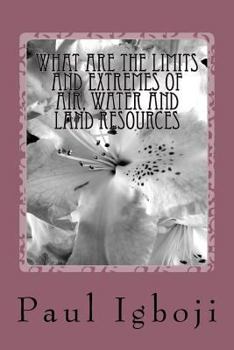What are the limits and extremes of air, water and land resources: The price of nature
Under natural and conventional conditions, it can be said that air resources are unlimited if pollution free (which is not possible); even though pollution in the actual sense may not be used as index of air limitability. But pollution drives a lot of air processes including the quality of the ones we breathe, their effects on ozone layer depletion, global warming, climate change, melting of arctic ice, rise in sea level, tsunami and other environmental catastrophes that shape the extremes and limits of air resources.On the other hand, fresh water resources are limited, while marine waters are unlimited to the aspect of quantity, but limited on the angle of quality and marine resources harvesting. They are subject of abuse in the controversial practices of dumping at sea and over-harvesting of marine lives. The underground water (aquifer) that supplies only 1 - 2% of potable water are prone to contamination and pollution by leachates from waste treatment plants and sewage facilities; and in most regions by heavy metals such as cadmium, aluminium, arsenium, lead, zinc. The cost of treating other fresh water like rivers, lakes, ponds, streams, dams and their scarcity (less than 5% of global water resources) also confirms their limitability. Their contamination by dissolved solids including salts, industrial chemicals/wastes/effluents, agricultural/industrial/domestic pesticides, clinical and radioactive wastes makes a case for their limitability. Hence, a popular saying "Water Water Water Everywhere but limited potable and affordable one to drink".On the next hand, land/soil is a limited resource, even from elementary knowledge of economics; not only on the part that less than 25% of the land surface is made up of land, the rest (over 70%) by water. To worsen the scenario, the whole world land has been based on conquer and occupy especially from the era of colonial and military expeditions. How each man came to find himself in any land in the universe is another thesis of its own. The limitability of land/soil from the point of degradation, contamination, pollution is endless. The cost of reclamation of low lying and upland land especially under degradation/contamination/pollution namely: earthquake, erosion, landslide, desertification, salinization, flooding, soil spilling, overgrazing, over-tillage and others too numerous to mention are very enormous and adds pressure to land resources. Moreover, agricultural production is more on land (over 95%) and less on water (
Format:Paperback
Language:English
ISBN:1536807796
ISBN13:9781536807790
Release Date:July 2016
Publisher:Createspace Independent Publishing Platform
Length:34 Pages
Weight:0.13 lbs.
Dimensions:0.1" x 6.0" x 9.0"
Customer Reviews
0 rating





